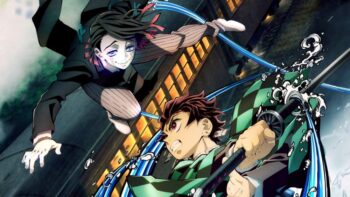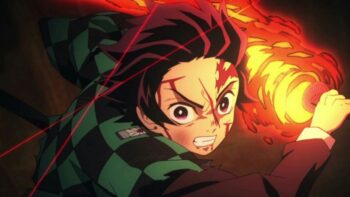Film Review: Demon Slayer: Mugen Train
With its immediately captivating and brilliantly paced storyline, bolstered by established, fleshed-out characters and exceptional voice-acting, Demon Slayer: Mugen Train is an absolute dream for fans of anime and the Demon Slayer series, while remaining accessible and wildly entertaining for newcomers to the series or genre.
Originally released in October 2020 in Japan, it became the country’s highest-grossing film of all time, highest-grossing anime film and Japanese film of all time, and was the fourth-highest grossing film of 2020, brought to the big screen by original-series director Haruo Sotozaki, whose notable contributions to the genre as key animator include Cowboy Bebop: The Movie, Tales of Vesperia, Tales of Zestiria: Dawn of the Shepherd, and the Fullmetal Alchemist: Brotherhood series.
Demon Slayer: Kimetsu no Yaiba the Movie: Mugen Train (Gekijō-ban “Kimetsu no Yaiba” Mugen Ressha-hen and also known as Demon Slayer: Mugen Train or Demon Slayer: Infinity Train) is a direct sequel to the 2019 anime series, Demon Slayer, beginning where the 26th episode of the anime series ends.
The film follows Tanjiro (Natsuki Hanae), Inosuke (Yoshitsugu Matsuoka), Zenitsu (Hiro Shimono) and Nezuko (Akari Kitō) as they board a train to meet the Flame Hashira Kyōjurō Rengoku (Satoshi Hino) and assist him in his mission to hunt for a demon that has killed more than 40 demon slayers on a train.
 In a description that barely scratches the surface of the anime’s lore: Tanjiro, Inosuke, and Zenitsu are all members of the Demon Slayer Corps (Demon Slayers with various elemental bonds and influenced abilities), while Tanjiro’s sister, Nezuko, is a rare demon who fights alongside them, and Rengoku is a Hashira (a group of elite Demon Slayers who represent the most powerful and high-ranked members of the Demon Slayer Corps, each representing mastery of a particular elemental form).
In a description that barely scratches the surface of the anime’s lore: Tanjiro, Inosuke, and Zenitsu are all members of the Demon Slayer Corps (Demon Slayers with various elemental bonds and influenced abilities), while Tanjiro’s sister, Nezuko, is a rare demon who fights alongside them, and Rengoku is a Hashira (a group of elite Demon Slayers who represent the most powerful and high-ranked members of the Demon Slayer Corps, each representing mastery of a particular elemental form).
There’s a lot to take in for anyone without any prior knowledge of the Demon Slayer story or its lore, but the film remains self-contained in a way that still makes it perfectly accessible for anyone completely unfamiliar with the series. Exposition of the deeper lore and continuing storyline is well-placed and done so with enough subtlety to make these moments feel exciting and rewarding for long-time fans, while providing just enough flavour to the story that it’s never wildly confusing or detracting from the film’s pacing.
At no point does the film feel like it was manufactured to either appeal to an entirely new audience, or solely reward its existing one, and it does this so well that it’s sure to inspire excited and curious new fans to discover the series and its much wider cast of characters. While the film focuses primarily on a singular setting, storyline and handful of these characters, many of the series’ regulars appear at just the right time to allude to a much wider and continually exciting world without confusing an unfamiliar audience.
The animation quality (the work of character designer and (chief animation director, Akira Matsushima) is superb, with every frame feeling precisely curated but not overdone, with natural grace in the animation style that allows the film to weave its way through genres, playfully jumping from action to comedy to horror to existential drama and back again in a manner that seems not only perfectly natural, but complementary to the confines of its runtime.
 The duo behind the film’s soundtrack is Yuki Kajiura and Go Shiina, who bring an exceptional background of work which includes Noir, Sword Art: Online, Blood: The Last Vampire, God Eater, Tekken 6 and Tag Tournament 2, and Code Vein. Fans of their work across the anime, film, and video game soundtrack genres will be delighted to see the best of both artists brought together here, seamlessly drifting from the haunting, gentle sounds of the character’s inner worlds to the heart-racing, heroic battle themes which blend perfectly with the visual action on display.
The duo behind the film’s soundtrack is Yuki Kajiura and Go Shiina, who bring an exceptional background of work which includes Noir, Sword Art: Online, Blood: The Last Vampire, God Eater, Tekken 6 and Tag Tournament 2, and Code Vein. Fans of their work across the anime, film, and video game soundtrack genres will be delighted to see the best of both artists brought together here, seamlessly drifting from the haunting, gentle sounds of the character’s inner worlds to the heart-racing, heroic battle themes which blend perfectly with the visual action on display.
Despite the focus on action and flair, it’s also a film with some incredibly grim and emotionally wrenching scenes and imagery. There’s an endless heart beneath the surface of the film and, while these moments are true-to-form exaggerated, they rarely detract from the tonal balance shown otherwise. The only downside for anyone who hasn’t seen the anime would be a mildly unsatisfactory ending, which would both require anyone wanting more of certain characters to dive retrospectively into the anime series with a heavy heart and to consume the show in its entirety.
At 26 equally entertaining episodes, this is unlikely to feel like a chore or a waste of time for anyone taken with the film, but does mean your journey will feel somewhat different to anyone entering the cinema with the full knowledge of the series already embedded in their subconscious.
Yet, Mugen Train stands out on its own merit regardless of which path the viewer takes in discovering its story; it’s a narrative filled with themes of self-doubt, regret, shame, and both the strength and courage it takes to overcome these. It dives headfirst into trauma and the cruelty that stems from power struggles between those driven by hope and those furthered by a lack of human empathy.
While an English-dubbed version is set for a release later in the year, I’d highly recommend anyone comfortable with subtitles take Mugen Train in its original form. The performance style of the original voice actors is perfectly suited to the playful shifts in tone throughout, and lends itself beautifully to the emotional highs and lows of the narrative.
Seeing anime in a cinema environment often provides an experience unavailable outside it; while not every film is necessarily improved or transformed by the size of a cinema screen or the booming clarity of a professional sound system, the recent, brief re-release of the masterpiece Akira in New Zealand cinemas proved that even a film I’ve watched a hundred times can provide an entirely different experience than the one you may be familiar with.
If it’s your first time seeing anime on the big screen, or you’re not particularly knowledgeable about anime series, Demon Slayer: Mugen Train is the perfect introduction to the cinematic potential of this medium. The fight scenes are as thrilling as they are gorgeous, pushing the visuals and intensity of the story to the limits of overstimulation, and are married perfectly with the film’s epic battle soundtrack.
Despite some incredible VA talent slated to tackle the dubbed version and no doubt extend its appeal even further, the best (and currently only) way to experience Demon Slayer: Mugen Train is as it was originally intended – so grab a ticket, hop aboard this adorably spooky dark-fantasy demon train, and get ready for one hell of a ride.
Dir: Haruo Sotozaki. Starring: Natsuki Hanae, Akari Kitō, Yoshitsugu Matsuoka, Hiro Shimono, Satoshi Hino, Daisuke Hirakawa, Akira Ishida.
Oxford Lamoureaux